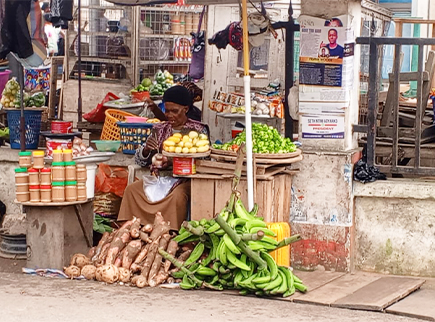Traders and consumers at the Kotokuraba Market in Cape Coast have welcomed significant reductions in foodstuff prices, following months of soaring costs that burdened households.
A Ghana News Agency (GNA) survey conducted on Monday, July 28, revealed price drops ranging from 10 to 55 percent across various food items, including vegetables, cereals, and tubers, over the past two months.
Traders attributed the reduction to a combination of factors, including a strong vegetable harvest season, appreciation of the cedi, stable transportation fares, and localized market surpluses.
Madam Ernestina Mills, a vegetable trader, reported that a bag of cabbage now sells for GH¢200, down from GH¢500, while onions have dropped from GH¢4,000 to GH¢1,300, and an “olonka” from GH¢100 to GH¢50.
A bag of pepper declined from GH¢2,500 to GH¢700, and green pepper from GH¢500 to GH¢400.

Madam Mary Mensah added that a bag of garden eggs now costs GH¢120, down from GH¢500, and the price of an olonka has reduced from GH¢70 to GH¢30.
Cucumbers dropped from GH¢1,000 to GH¢800, carrots from GH¢400 to GH¢350, and tomatoes from GH¢2,500 to GH¢800.
Kontomire leaves, previously sold for GH¢20, now go for GH¢5 for the larger size.
Maame Afia, a cereals trader, said the price of maize has dropped from GH¢1,100 to GH¢900, and an olonka from GH¢35 to GH¢30.
Groundnuts now sell at GH¢50 per olonka, down from GH¢55; Bambara beans fell from GH¢90 to GH¢70, soya beans from GH¢48 to GH¢35, wheat from GH¢54 to GH¢48, and millet from GH¢45 to GH¢40.
Small sacks of cassava are now selling for GH¢350, reduced from GH¢500, while the price of new yam remains relatively stable, ranging from GH¢40 to GH¢60.
A shopper told GNA, “It feels as though a heavy burden has been lifted from my shoulders. For months, we’ve been worried about food costs, but now we can afford to buy enough for our families.”
Many buyers said the price drops not only offer immediate financial relief but also inspire hope for long-term price stability, improved access to nutritious food, and better livelihoods for both traders and households.

